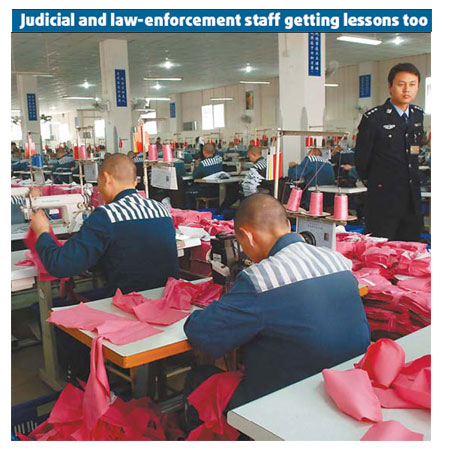|

|
|
?Inmates work at a prison in Chengdu, Sichuan province, on April 16. [Wu Chuanming/China Daily] |
The Ministry of Justice (MOJ) has launched a two-month training program for more than 700 warden directors of prisons across the country to "improve their ability to reform inmates".
Justice Minister Wu Aiying said during the launch of the program on Tuesday that the rate of prisoners going back to committing crimes after their release determines the standards of prison management.
"We must constantly try to educate prisoners and reform them, so that they don't return to the world of crime after being released from prison," she said.
She added that it was the responsibility of the prison management to impart "moral, legal and vocational knowledge to the inmates".
Wang Gongyi, deputy director of the ministry's research bureau, said data recorded over the past five years suggested that nearly 2 percent of the inmates released from prisons committed crimes again.
"The training program will help prison police better understand criminal psychology," he told China Daily yesterday.
 He said it was even more important to provide vocational training to the inmates to make them confident of earning a living by fair means once they are released.
He said it was even more important to provide vocational training to the inmates to make them confident of earning a living by fair means once they are released.
"Most prisoners who return to crime are those who haven't gone beyond junior middle school and possess little legal awareness," he said. "They lack family support and are not able to find jobs. Many of them don't even have a roof over their heads as their families have disowned them."
In a bid to expand prisoners' vocational and technical capacity, prisons are now offering specialized classes in welding, woodwork, cooking, computers and hairdressing.
The central government has spent tens of billions of yuan since 2003 to relocate 300 prisons that once stood in remote mountainous regions to the outskirts of major cities.
"With most prisons now located near cities, it makes it a lot easier to gather resources for vocational and technical training," Wang said.
'No torture'
Wang denied inmates of Chinese prisons were bullied or tortured.
"Most people don't realize detention facilities and prisons are different," Wang said.
The country's detention centers have been in the eye of storm in recent months, with a number of inmates dying under mysterious circumstances in police custody.
Detention facilities, which house under-trial suspects, come under the management of the public security department, while prisons are the responsibility of the Ministry of Justice, Wang clarified.
"Prison management is very strict and leaves no room for bullies or tortures," he said.
All prison inmates have to work for five days a week for eight hours every day and study one day in a week, with a day off for rest, he said.
"Every prisoner tries to behave well so that his or her time is reduced.
"And every prison in the country follows the time-rebate system - the better a prisoner behaves, the sooner he is released."
China has more than 700 prisons, where more than more than 1.5 million prisoners are currently lodged.
(China Daily June 5, 2009)